#I don't know what I want either Adora nw
Explore tagged Tumblr posts
Text
What do you want, Adora??
Why does this line from She-Ra destroy me? Like it hits so hard and I feel like it’s because it’s such a simple question, but Adora has never once seemed to have thought about the answer. What does this say about her? What are the writers trying to show through her struggle to consider the answer to this question?
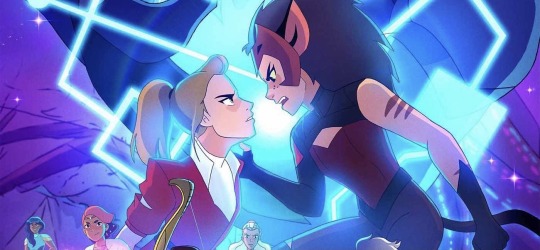
I think the show really interestingly explores it by deconstructing the concepts of selfishness and selfless, especially when in relation to individual wants/desires and self-care.
There is definitely a spectrum at play with these principles. On one end, you have complete selfishness. Other people’s feelings aren’t important. You must do what you need to do to make yourself happy. This might be self-care (because you are getting what you want), but it’s also making a negative impact on others and therefore, is selfish and damaging.
On the other end, there is complete selflessness. This is putting everyone else’s needs before your own and not engaging in self-care at all because any type of behavior that is done at the individual level feels selfish. However, although this seems morally upstanding, it can be ultimately harmful to the self at an individual level.
This is why the best types of self-care strike a balance between what a person needs at an individual level and how these wants may impact other people as well. It’s not on either side of the spectrum, but rather, at an undefined, malleable point somewhere in the middle.
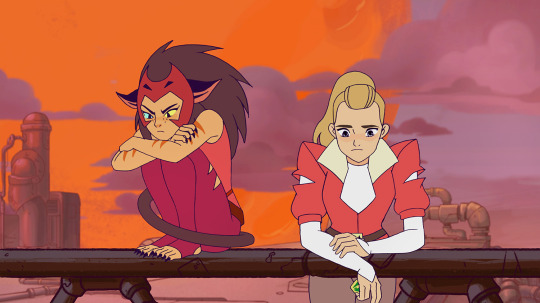
And She-Ra explores this idea in the same way that it does with most other ones: through Catra and Adora’s character arcs.
In the beginning, many of Catra’s actions are selfish. That is not to say that she is irredeemable- she was an abused child, so she finds that the only way for her to get control and love is through acting seflishly. In other words, she thinks she needs to take what she wants because no one was ever considerate of her so in order to be happy, she can’t care about what happens to them either (this is a warped world view but regardless...)
Think about Adora’s decision to leave the Horde through Catra’s eyes. To her, this was selfish. Adora left to get new friends and new powers, but didn’t take into account how it would affect Catra (which may not be true, but it’s accurate to Catra). Therefore, she decides to pursue her own desires in a similar way. She wants the Horde to win to defeat Adora, regardless of the morally problematic nature of the Horde. She opens the portal to live happily with Adora without thinking about how it literally could have ended the world!! These are all exceedingly selfish actions that Catra performs because she just wants to be happy, stop hurting, and win for once. And she doesn’t care who she hurts along the way.

Until the guilt comes.
After the portal, Catra is finally confronted with the effects of her selfishness- and eventually, is forced to see that her actions are not a type of self-care or ambition, but in fact, just selfish. And have been constantly damaging her relationships throughout the series as well (namely those with Adora, Scorpia, and Entrapta).
Catra was much too far on the one end of the scale, exploring the consequences of selfishness and how it damages interpersonal connection.
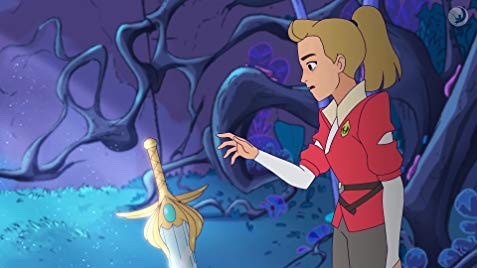
On the other hand, Adora deals with the exact opposite. Throughout the series, it becomes clear that Adora never does anything for herself. She sacrifices her own wants and needs to do what is right for the world and will help the most people (this often has to do with her duty as She-Ra).
This distinction isn’t super problematic in the beginning because Adora’s wants often align with what the world needs. She wants to defeat the Horde and her duty is to do so, etc.
However, whenever she is really confronted (emotionally speaking) by Catra, this is when the two paths split. Adora never wants to hurt Catra, she shows her mercy, even when it’s not the best strategic move, and even after Catra opens the portal, Adora refuses to leave her behind, even though the world really just needs her to forget about Catra and shut the portal down.
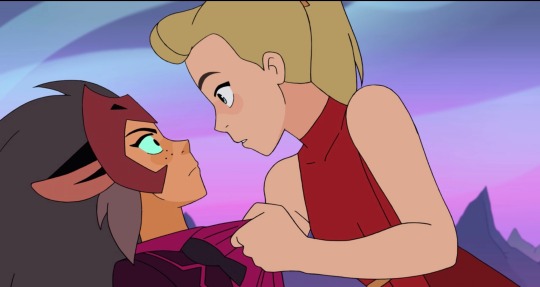
This distinction is further exacerbated after Catra redeems herself- because now, Adora is confronted more and more by the difference between what she wants (to be with Catra and keep her safe) and what everyone else needs (for Adora to let go of Catra and fulfill her duty as She-Ra).
As Shadow Weaver puts it, Catra is a distraction to Adora- one that is preventing her from being able to help the others around her. It doesn’t matter what Adora wants. She has a higher duty.
In this way, Adora does not think that she is allowed to care about herself. Others must always come first. To her, allowing herself to love Catra is selfish because it does not take into account all of the people that Adora is responsible for (all of Etheria is counting on her). And having to constantly forget herself and be deprived of what she actually wants deeply damages Adora- because she doesn’t think that she deserves to be happy on an individual level- even though everyone needs some sort of self-care or happiness in their lives. Adora needs Catra. It is not selfish for her to want love. But Adora isn’t able to see that (especially with all the pressure surrounding her duty as She-Ra), and she suffers. And this suffering is actually what prevents her from turning into She-Ra, not her selfishness or distraction.
This is why Adora is on the exact other end of the spectrum as Catra. She is much too selfless, which causes her to be unhappy on a personal level. And this inhibits her from positively impacting others. Therefore, it’s not actually more responsible to be selfless- it can have a negative impact, just as selfishness can.
But as the show continues on, both Catra and Adora drift further and further into the middle area.
Catra is first. After finally seeing how destructive selfishness can be (it literally destroyed ALL of her relationships), Catra sees that taking into account other people is not weakness, but rather, vital to caring for yourself too.
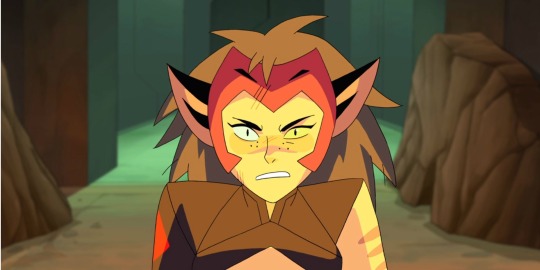
Take Catra’s apology to Adora in Corridors, for example. This is a moment where Catra does something that is truly not motivated by her own desires. It is not selfish. It’s a sacrifice- she gives herself up, expecting nothing in return, and ultimately hoping Adora can finally be happy. She doesn’t care what happens to her anymore.
This moment was huge because she finally drifts back into the middle of this scale and does something that will benefit the world as a whole, rather than fulfilling her selfish desires.
However, this move is actually a bit of an overcorrection, which is important. Catra doesn’t know how to be both considerate of others and loving towards herself. She goes straight to the other side of the spectrum (to selfishness), giving up her own autonomy and freedom and fully believing that she is worthless and does not deserve to get anything she wants (because she’s hurt so many people). It makes sense why Catra would think this, but again, the show smartly combats this ideal.
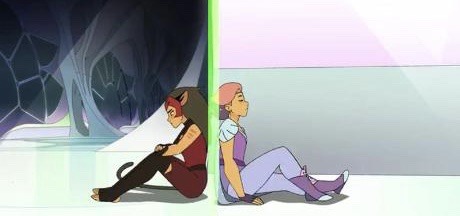
Although this moment could have been Catra’s hero moment, and her sacrifice could have just ended there, having Adora go back for her, forgive her, and remind her that she does have worth and she does deserve love, displays that Catra’s decision was actually not the final answer because it didn’t involve Catra learning to love herself.
Adora’s loyalty and love shows Catra that she does not need to overcorrect and be a selfless sacrificial pawn to save everyone else. She is allowed to still have wants and desires, just as long as she doesn’t hurt other people on the road to them (ironically, this is the exact lesson that Adora needs to learn too).
And as Catra slowly apologizes for everything she’s done and redeems herself, she finally starts to really learn how to navigate selfishness and live comfortably in the middle area. After some struggles with it (Catra leaving Adora because she feels like she’s in the way), Catra’s entire journey culminates in her final decision to stay with Adora and ultimately, to confess her love for her.
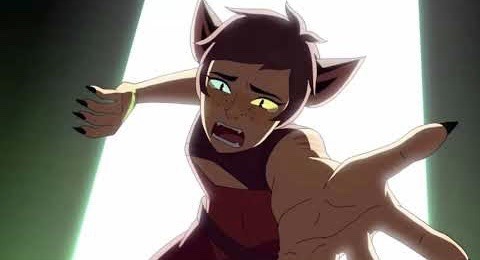
Even though she was told her love was a distraction for Adora and they both thought they wouldn’t have time for it (the world was basically ending), she decides that they both deserve it and are allowed to want it. This is HUGE. This is Catra’s hero moment (Noelle has even said this!), because even though at the climax of this huge world-wide conflict, she allows Adora to attempt to save the world (even though she may die), which displays her being considerate of Adora’s responsibility to save everyone, eventually SHE DRAWS THE LINE while watching Adora die. She will not let her go. They both deserve to survive and get what they want: love.
Adora goes through has a similar journey. As the finale approaches, she feels an immense pressure to be the selfless hero that she’s supposed to be (like Mara was), but both Catra and Mara challenge that ideal, asking Adora what it is that she personally wants. But she doesn’t think she’s allowed to want anything.
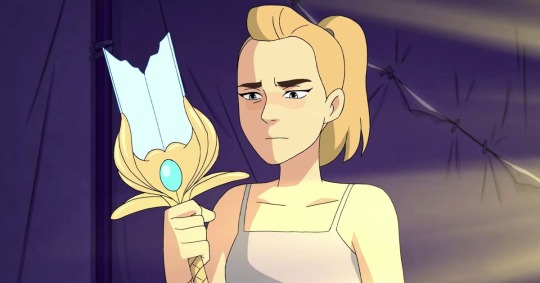
Adora is also having trouble transforming and she thinks it’s because she’s not being selfless enough, but it’s actually the opposite. Once Catra leaves her, she glitches because she feels unfulfilled and heartbroken that she’ll never get to be with Catra.
And in her final hero moment, when she can’t transform into She-Ra and she starts dying, we’re given a literal representation of Adora’s individual desires through the dream: she just wants love (from Catra and from Glimmer and Bow).
So when Catra comes through into her vision, confessing her love, Adora thinks that she’s going to die and she knows she’s done all she can for the revolution (she literally can’t help anymore). So she finally has a MOMENT to think about what she actually wants.
And she wants to be with Catra. She wants to love her and be loved by her. So she confesses her love back.
And then transforms.
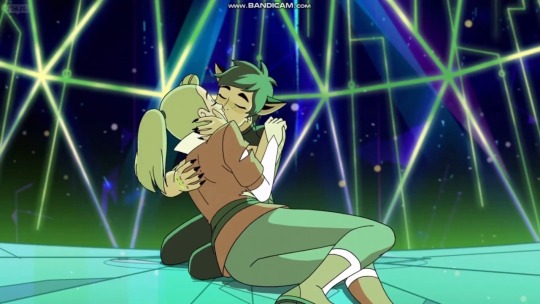
Her want for love on a personal level wasn’t a distraction. In fact, it was the solution.
This is the middle area, where they’re supposed to be. Which is why this love is so powerful, and why it helps Adora transform and save everyone anyway.
Finally, the message becomes resoundingly clear: People who don’t care about themselves aren’t healthy. Being selfless isn’t the ultimate goal. People who care about themselves as much as they care about others are actually much more powerful than the ones that are deprived of self care and love. This is why Adora is able to save everyone- because she cares for herself first.
What a rare message for a chosen one-type story. The hero is encouraged to think about what they want on a personal level- and use the happiness they get from their fulfillment to become an even better hero.
Overall, the show takes the time to really tease apart how harmful both selfishness and selflessness can be. It displays to viewers the important lesson that engaging in self-care is okay (often, it’s extremely vital) and as long as you consider the feelings of others as well, you will become the best version of yourself possible- regardless of whether you’re an 8ft tall warrior woman, who can then restore balance to the world or a reformed villain, who can finally overcome self-hatred and both give and receive love as a result.
#I don't know what I want either Adora nw#spop catra#spop adora#she ra spop#she ra#she ra catra#she ra catradora
12 notes
·
View notes